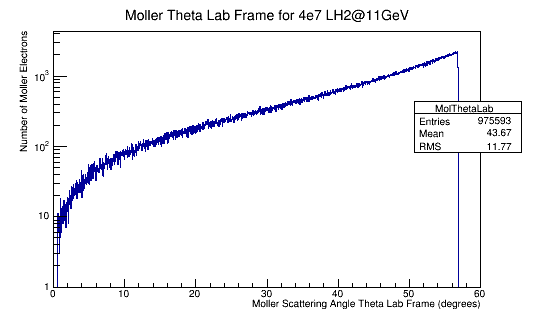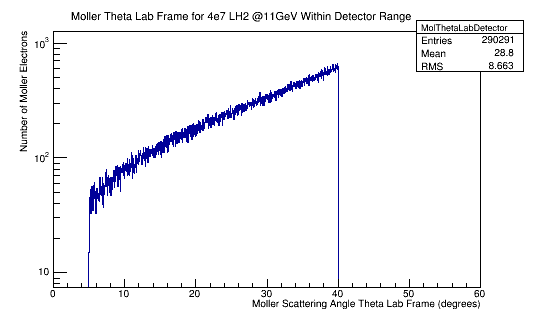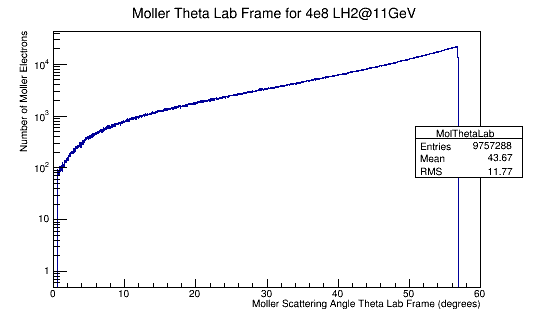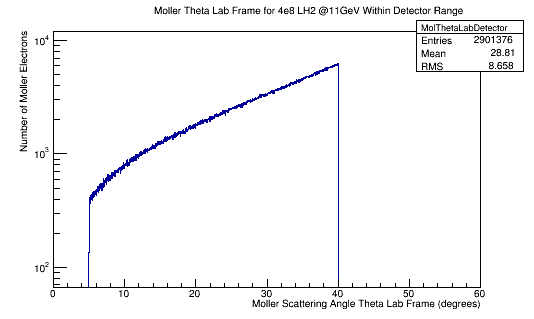[math]\textbf{Navigation}[/math]
[math]\vartriangleleft [/math]
[math]\triangle [/math]
[math]\vartriangleright [/math]
https://wiki.iac.isu.edu/index.php/Converting_to_barns
https://wiki.iac.isu.edu/index.php/Check_Differential_Cross-Section
Converting the number of electrons scattered per angle theta to barns, we can use the relation
[math]\mathcal{L}=\frac{R_{scattered}}{\sigma} = \Phi_{beam}\ \rho\ \ell [/math]
[math]\sigma=\frac{R_{scattered}}{\mathcal{L}} =\frac{R_{scattered}}{\Phi_{beam}\ \rho\ \ell}= \frac{R_{scattered}}{R_{incident}\ \rho\ \ell}=\frac{N_{scattered}}{\Delta t}\cdot \frac{\Delta t}{N_{incident}}\cdot \frac{1}{\rho \ell}[/math]
If the time is taken to be the same for the amount scattered as for the amount incident (the time simulated), this can be viewed as the probability of one incident electron producing a Moller event.
[math]\sigma=\frac{N_{scattered}}{N_{incident}}\frac{1}{\rho \ell}[/math]
While this expression has no explicit dependancies on energy, the ratio is a function of the energy, as well as the physical makeup of the target.
This gives, for LH2:
[math]\rho_{target}\times l_{target}=\frac{70.85 kg}{1 m^3}\times \frac{1 mole}{2.02 g} \times \frac{1000g}{1 kg} \times \frac{6\times10^{23} molecule}{1 mole} \times \frac{2\ atoms}{molecule}\times \frac{1m^3}{(100 cm)^3} \times \frac{5 cm}{ } \times \frac{1 \times 10^{-24} cm^{2}}{barn} =.21 barns^{-1}[/math]
From earlier simulations for random angle Phi, we know that the full range of Theta is limited depending on the target material.






For 4e7 incident electrons:
[math]\sigma = \frac{N_{events}}{N_{incident}\ \rho\ \ell}=\frac{975593}{40000000\ \cdot 4.2\times 10^{-2} barns^{-1}}=\frac{0.024}{4.2\times 10^{-2} barns^{-1}}=0.58 barns[/math]
[math]\sigma=\frac{R_{events}}{\mathcal{L}} \Rightarrow \mathcal{L}=\frac{R_{events}}{\sigma}[/math]
[math]\mathcal{L}=\frac{dN_{events}}{dt}\frac{1}{ \sigma}\Rightarrow \int_{0}^{t_{simulated}}\mathcal {L}\, dt= \int_{0}^{N_{events}}\frac{1}{\sigma}\, dN[/math]
[math]\mathcal{L} \cdot t_{simulated}=\frac{N_{events}}{\sigma}[/math]
For a Luminosity of [math]\mathcal{L}=\frac{1.3\times 10^{11}}{barn\cdot s}[/math]
[math]\frac{1.3\times 10^{11}}{barn\cdot s} \cdot t_{simulated}=\frac{975593}{.58\ barn}[/math]
[math]t=1.3\times 10^{-5}\ s[/math]
For 4e8 incident electrons:
[math]\sigma = \frac{N_{events}}{N_{incident}\ \rho\ \ell}=\frac{9757288}{400000000\ \cdot 4.2\times 10^{-2} barns^{-1}}=\frac{0.024}{4.2\times 10^{-2} barns^{-1}}=0.58 barns[/math]
[math]\sigma=\frac{R_{events}}{\mathcal{L}} \Rightarrow \mathcal{L}=\frac{R_{events}}{\sigma}[/math]
[math]\mathcal{L}=\frac{dN_{events}}{dt}\frac{1}{ \sigma}\Rightarrow \int_{0}^{t_{simulated}}\mathcal {L}\, dt= \int_{0}^{N_{events}}\frac{1}{\sigma}\, dN[/math]
[math]\mathcal{L} \cdot t_{simulated}=\frac{N_{events}}{\sigma}[/math]
For a Luminosity of [math]\mathcal{L}=\frac{1.3\times 10^{11}}{barn\cdot s}[/math]
[math]\frac{1.3\times 10^{11}}{barn\cdot s} \cdot t_{simulated}=\frac{9757288}{.58\ barn}[/math]
[math]t=1.3\times 10^{-4}\ s[/math]
For 6e7 incident electrons with a 5cm long LH2 target:
[math]\sigma = \frac{N_{events}}{N_{incident}\ \rho\ \ell}=\frac{4584834}{60000000\ \cdot .21barns^{-1}}=\frac{0.076}{.21 barns^{-1}}=0.016 barns[/math]
[math]\sigma=\frac{R_{events}}{\mathcal{L}} \Rightarrow \mathcal{L}=\frac{R_{events}}{\sigma}[/math]
[math]\mathcal{L}=\frac{dN_{events}}{dt}\frac{1}{ \sigma}\Rightarrow \int_{0}^{t_{simulated}}\mathcal {L}\, dt= \int_{0}^{N_{events}}\frac{1}{\sigma}\, dN[/math]
[math]\mathcal{L} \cdot t_{simulated}=\frac{N_{events}}{\sigma}[/math]
For a Luminosity of [math]\mathcal{L}=\frac{1.3\times 10^{11}}{barn\cdot s}[/math]
[math]\frac{1.3\times 10^{11}}{barn\cdot s} \cdot t_{simulated}=\frac{9757288}{.58\ barn}[/math]
[math]t=9.7\times 10^{-5}\ s[/math]





